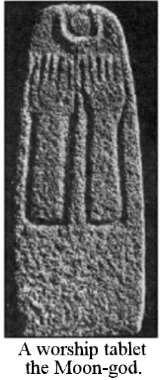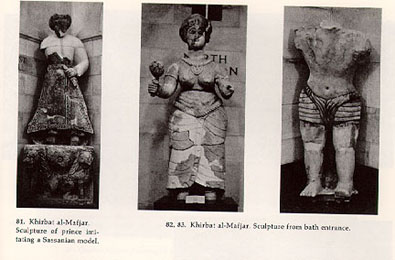
April 20th, 1998
 |
Issue# 1999.00 April 20th, 1998 |
 |
 |
 |
Aditi Chaturvedi The Hindus of Arabia lived in a land where their forefathers had lived and prospered for ages past. They were proud inheritors of the ancient Vedic culture and religion. Mecca was a city whose commerce was expanding greatly and whose power and prestige were well established. Meccans were content, prosperous and devoted to the religion of their ancestors. The Kaaba temple drew thousands of devotees from around the world. Trade and barter flourished greatly, due to the immense number of visitors who came to Mecca on pilgrimage. The members of the Qurayshi tribe to which Muhammad belonged, were the priests who performed the rites and rituals for these pilgrims, thereby deriving their very livelihood from the Vedic gods of the Kaaba. It is no wonder that the majority of them later rejected Muhammad's new religion and paid for it with their lives. In any case the Meccans were exceedingly devoted to their gods and very satisfied with the state of their lives. They were not at all on the lookout for a new cult or savior who could rescue them from a miserable state or lead them into a promised land. They had rejected Monotheism wholeheartedly during the short lived Jewish regime in Yemen and their Vedic gods had protected them very well against the Abyssinian Invasion. They were skeptical and amused by prophets foaming at the mouth and dismissed them as magicians or just plain lunatics. They did not want to hear any so called "revelations" or so called heavenly "messengers". In short the Arabs were noble, content people, who felt spiritually enriched and materialistically satisfied. It is only in such successful societies that the qualities of tolerance, equality of the sexes, independence, love of free thinking, and cultural enrichment can exist. When Muhammad first started preaching his "new"
religion the Meccans tolerated it as they had tolerated many
such propounders of "new" religions before. However
they were startled out of their tolerance when the small band
of Islamists started to publicly ridicule the Vedic heritage
of the Meccans and threatened to break down the idols, which
were the pride of Mecca. At first they proceeded in a calm manner
to Muhammad's uncle Abu Talib and told him that his nephew had
"cursed our gods, insulted our religion, mocked our way
of life and accused our revered forefathers of error. We request
you to restrain him."  Figure 1. But Muhammad continued insulting the Vedic heritage of the Meccans. He considered his epileptic fits as periods of divine revelation and his bitter invectives against the Vedic religion grew stronger. The Arabs of Mecca were now convinced that Muhammad was a lunatic who deserved only pity. This charge stung Muhammad to such an extent that he retorted bitterly "By him who holds my life in his hand, I bring you slaughter". and came up with revelations such as:
The Meccans were now stunned and convinced that such virulence and hatred could only come from one who is possessed by an evil spirit. They sent Utba B. Rabia one of their chiefs to Muhammad. Utba kindly explained to him that " If this ghost which comes to you is such that you cannot get rid of him, we will find a physician for you and exhaust our means in getting you cured, for often a spirit takes possession of a man until he can be cured of it." Muhammad reacted violently and warned the Meccans to leave him alone. The patience of the Arabs had come to an end, they decided it was time to fight back. In the spirit of their Vedic culture , they invited Muhammad to an open debate. It was soon obvious from the debates that Muhammad could not present arguments in a logical manner. He would lose his temper and resort to violent and insulting answers to the questioners. Soon after he claimed a divine revelation that instructed him not to participate in open debate, to evade questions, and if questioned by unbelievers to retire! (Quran 6:68-70) Now the Meccans were amused that a man like Muhammad who was distinguished neither by birth or education should go around proclaiming himself to be a prophet. When he started producing revelations about Moses and Jesus having performed miracles, they asked Muhammad to do the same. Unlike Moses and Jesus however, Muhammad could not produce a single miracle. Instead he came up with a revelation that the Meccans were not likely to believe in a miracle even if it were shown to them! Now the Meccans were convinced about the falsity of Muhammad's claims. Their faith in their Vedic deities was absolutely unshaken. Moreover they were enraged by the fact that Muhammad had taken their principal god Allah (Durga) and made her into the jealous deity of his new religion. They met him and said:
Muhammad then threw a challenge to the Meccans to produce revelations such as his. The challenge was accepted by Al Nadr B. Harith, a Meccan chief who said
Al Nadr proceeded to tell several stories in verses, which were even better than the verses of the Quran. Muhammad was enraged and never forgave Al Nadr for this defeat. Later on Muhammad had Al Nadr brutally executed. Muhammad had started preaching about how Judgement would come and bring destruction to the Non-believers. The Meccans however were not cowed down by mere threats. They challenged Muhammad to hurry up and bring down the Doom upon them. They said:
The Meccans threw this challenge again and again. Muhammad had to wriggle out of the situation somehow. He came up with another convenient revelation:
It was obvious that the Prophet had begun contradicting himself, the paradox was in the verse itself, for how could Allah tell Muhammad to await the Event of the Day of Judgement when he had made it clear that it would not happen while Muhammad was alive! The knowledgable Meccans had by now realized that Muhammad was only stealing things that he had learned from the Jews and the Christians. He was taking Biblical lore and conveniently twisting it to conform with his own "divine" religion. Moreover it was obvious that Muhammad was coming up with "holy verses" whenever the occasion demanded for his convenience. The incident that confirmed their suspicion was the Satanic Verses which say:
The Satanic Verses of the Quran clearly state that Al-Lat and Al-Uzza and Manat (Alla = Durga, Oorja = Shakti (life-force) and Somnath = Shivji) are exalted and their intercession is approved. The Meccans were overjoyed that Muhammad had finally endorsed the Vedic deities, but because of the pressure of his followers, Muhammad had to withdraw the verses.  Figure 2. Sculptures of Pre-Islamic gods This was the last straw. The Meccans were now convinced of the lies perpetuated by Muhammad. Their chieftains said:
and to their people:
Muhammad's mission at Mecca had failed. The Arabs with their fierce love for their Vedic heritage and intelligence had seen through the "Prophet's machinations and rejected him whole-heartedly. Thus it was an embittered, furious and vengeful Muhammad who was forced to flee to Medinah. It is no secret what the Prophet did after this "migration" to Medinah. The story has been documented in detail by his biographers, - surprise raids on trade caravans and tribal settlements, the use of plunder thus obtained for recruiting an ever growing army of greedy desperados assassinations of opponents, expropriation, expulsion and massacre of the Jews of Medinah, attack and enslavement of the Jews of Khybar, rape of women and children, sale of these victims after rape, trickery, trachery and bribery employed to their fullest extent to grow the numbers of his religion Islam which ironically was supposed to mean "Peace"! He organised no less than 86 expeditions, 26 of which he led himself. The motives of the converts to Islam was never in any doubt. As D.S. Margoliouth states in his book Muhammad and the rise of Islam
On another occasion Muhammad was greatly criticised by his followers when he compromised his principles completely. After feeling very confident about the consolidation of his position in Medinah, Muhammad decided the time had come to take Mecca. But he soon realized that he had miscalculated the timing of his attack and at the last moment entered into negotiations with the Meccans. The Treaty of Hudaibiya permitted Muhammad to perform the pilgrimage to Mecca the following year, but in return he had to refrain from calling himself the "Prophet" and to refrain from preaching the formula of Islam. Muhammad agreed to all the conditions, and broke the Treaty much later. No wonder Dr. Magoliouth refers that:
In my next article, I will describe the trail of murder, mayhem and destruction that was effected by the Prophet after he had recruited enough people in his fold. Note: Works of P.N. Oak, D.S. Margoliouth and Sita Ram Goel have been used to compose this article. |
|
Previous | Index | Next Your comments |
|
© Sword of Truth, 2001 All rights reserved. Concept and Design by |